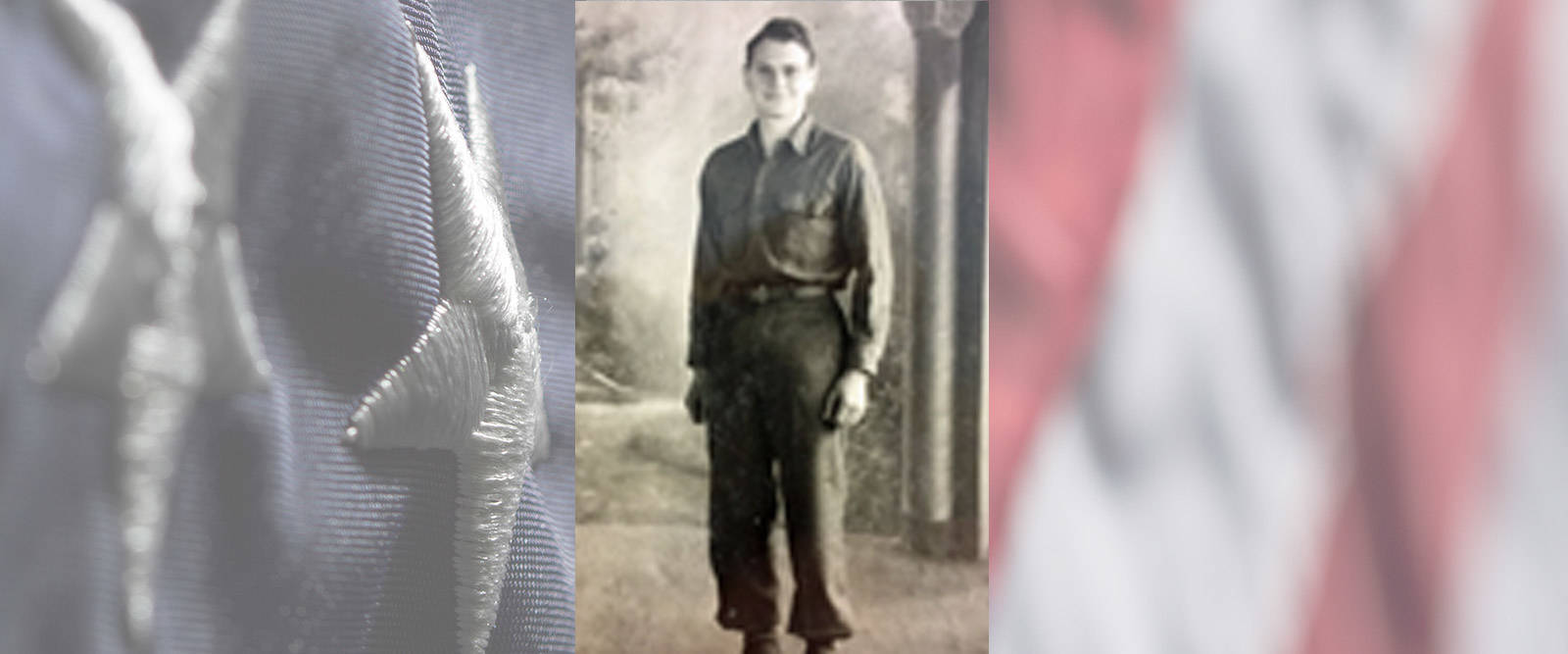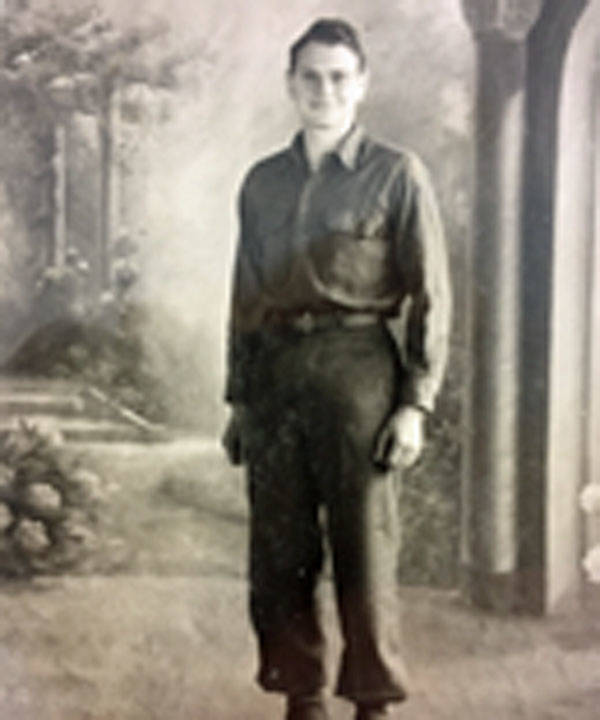U.S. Army World War II River Forest, IL Flight date: 09/12/18
By Mark Splitstone, Honor Flight Chicago Veteran Interviews Volunteer
Eugene Callen was born in 1926 in the Austin area of Chicago and attended Austin High School. In January 1944, before he turned 18 or graduated from high school, he volunteered for a US Army Reserve program, which he hoped would allow him to continue in school. He briefly attended the University of Chicago as part of this program, but because of the manpower shortage at the time, he was called up to active duty. He was sent to Camp Fannin outside Tyler, Texas, which was an infantry replacement training center. He says that it was the only place he’s ever been where it is possible to march in wet clay while at the same time being hit in the face with a sand storm. After several months of training, he was ready to get out of there and go fight somebody. He was assigned to the 66th Infantry Division which was forming at Camp Rucker in Alabama.
After doing some maneuvers and training in Alabama, the Division was transported to England arriving in Dorchester, England in late November, 1944. They prepared for deployment until late December, when they boarded ships to cross the English Channel and travel to France. Along the way, one of their transports was torpedoed by a German U-boat and sunk, killing nearly 800 men. It was one of the worst American naval disasters of the war. The original plan was for the Division to go to Belgium, where the Battle of the Bulge was going on, but they were reassigned and sent to northwestern France.
When the Allied armies finally broke out of their Normandy beachheads in the late summer and early fall after D-Day, they had bypassed many fortress towns, leaving an estimated 100,000 German soldiers behind. The Allies had decided to bypass these towns to avoid the high cost in time and lives that their capture would entail. The mission for the 66th Division was to mop up any German resistance remaining in Normandy and Brittany and contain the German troops that were pinned in the area. This meant bottling up several French towns that contained U-boat pens. These towns were heavily fortified and the Germans were reluctant to give them up.
Eugene remembers that when they got there it was still winter, and while it didn’t get bitterly cold, it was chilly and damp. On one of their first nights there, he and some buddies decided to build a fire to keep warm. Shortly thereafter, they heard a German artillery shell whistle overhead and explode behind them. Then, another shell landed in front of them. That was when they realized that the Germans were targeting the fire that they had built, so they ran into the nearest dugout. (Dugouts are temporary shelters constructed as concealment and protection during warfare). The next shell landed close to where they had been sitting, teaching them an early lesson about when and where to build fires.
The Germans in these fortress towns outgunned the Americans, and Eugene and the other soldiers were constantly aware of the risks of German artillery, especially their 88 mm guns, which he calls “fearsome.” Eugene recalls a time when his unit was monitoring a road in a valley and the Germans had 88’s on the other side of the valley. Everyone had to be careful to keep their heads down and crawl when they went back for food or supplies because when the Germans saw them, they would fire their 88’s. One time, Eugene remembers just barely making it back to his dugout before an 88 shell exploded nearby.
Eugene says that for much of the time their battles were similar to trench warfare in WWI. On a regular basis, the 66th Division squads were sent out on patrols. If they encountered fire they would return it; they also would report back with any intelligence that they discovered, which would be used to help target artillery. Eugene nearly lost his life on one of these patrols. These patrols were always dangerous because the area was covered with hedgerows, allowing the Germans plenty of time to fortify and camouflage the area. As the lead man when his squad went out on one patrol, Eugene approached a hedgerow and prepared to go over it. He recalls briefly seeing a rifle sticking up. He never saw the dugout where a shot came from; the bullet went through his helmet and hit him in his head. Another man in his squad killed the enemy soldier and then the squad returned to their lines, carrying the unconscious Eugene. He was taken to a field hospital and when he woke up, he was told that he had been very lucky—the bullet had grazed but not penetrated his skull. The doctor was able to sew him up and bandage the wound. The doctor told him he’d be fine and said that he’d be back on the line in 7-10 days, but Eugene didn’t believe that and told him so.
Another incident resulted in Eugene receiving a second Purple Heart. His squad was coming back from a patrol and happened upon a large dugout which they hadn’t seen before. They went in and started taking off their gear. A soldier standing next to Eugene accidentally pulled a rifle grenade out of his cartridge belt and dropped it, causing it to explode. The man’s legs were severely injured; another man had serious face wounds, and Eugene ended up with shrapnel in his torso.
Eugene and the 66th Division stayed in their positions until VE Day. Eugene was present when the commanding officer of the German forces formally surrendered and handed his sword to the commander of the 66th Division, General Kramer. Afterwards, Eugene was able to tour the German area and saw the U-boat pens, including one that still had a U-boat in it. He said he’s never seen so much concrete and that bombs would never have been able to take them out. In some places, the concrete was thirty feet thick. In fact, due to their durable construction, the U-boat bases are still there today because it’s not worth the cost to try to destroy them.
After VE Day, Eugene was transported by train to Cologne, Germany, to be part of the Army of Occupation. He says the city was almost completely destroyed. However, their stay there was brief when they moved to Marseille, France. They were put in charge of setting up a camp that would organize the transfer of soldiers from the European theatre to the Pacific theatre. Since Eugene thought his outfit would have to go to the Pacific, he was more than happy to stay in Europe and help other guys go. Fortunately for Eugene and his fellow soldiers, the war in the Pacific ended before they were transferred there. After about three months in Marseille, Eugene transferred back to the United States and was stationed near Portland, Maine until his discharge in May, 1946.
Eugene returned to Chicago and took advantage of the GI Bill by attending night school and studying mechanical engineering. At the same time, he and his brother started a company that made toy cap guns. This worked well initially, but when all the toy gun manufacturers who had switched to the manufacture of real guns during the war came back into the market, Eugene’s company couldn’t compete. His brother decided to go down a different path, allowing Eugene to keep the company’s die casting machine. In 1948, Eugene started a new company called Callen Manufacturing Company. It had great success during the booming post-war economy and still exists today. At age 92, Eugene is still the CEO and goes into the office two or three times a week.
Eugene started going steady with a girl when he was in high school at age 16. They corresponded regularly throughout the war and were married in 1948. He says that he went from living with his mom to living with his wife. They raised four children and now have seven grandchildren. Eugene lives in the same house in River Forest that he and his wife shared for many years. He considers himself very lucky to have survived the war. If he had been on the ship that sank, if the bullet that grazed his skull had been an inch to the left, if the rifle grenade had exploded at a slightly different angle—any of these things could have cost him his life.
Welcome Home, Eugene! Thank you for your courageous service and enjoy your well-deserved Honor Flight.




